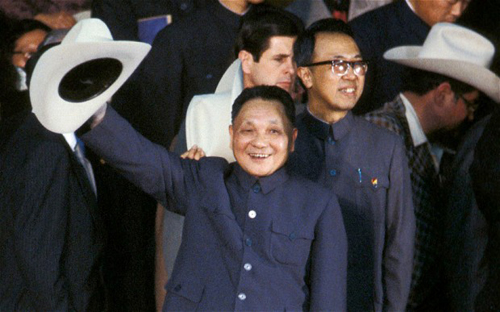|

January 1, 2014 marked the 35th anniversary of the establishment of diplomatic relations between the People's Republic of China and the United States. At times contentious, at times cordial, at times maddening, at times optimistic, it is a lasting legacy of the efforts put forth by Chairman Mao Zedong, Premier Zhou Enlai, President Richard Nixon, and Dr. Henry Kissinger.
Chinese Foreign Minister Wang Yi, in commemoration of the 35th anniversary of the establishment of China-U.S. diplomatic relations, rightly observed that: "The growth of China-U.S. relations in the past 35 years shows that sound relations between China and the United States not only meet the fundamental interest of the two peoples; they also contribute to peace, stability and development of the Asia-Pacific and the world." While the relationship has seen its ups and downs over the years, the China-U.S. relationship has witnessed tremendous progress from Ping Pong Diplomacy to a new model of major-country relations. Today, it is one of the most important, if not the most important, nation-to-nation relationships in the world.
As Premier Li Keqiang recently noted, mutual interests outweigh differences between China and the U.S. If one has any doubts that mutual interests outweigh differences, the following trade data should dispel that notion: In 1979, trade between China and the U.S. barely approached $2.4 billion. As of 2013, trade between China and the U.S. approached $560 billion.
The average American, while probably aware of the anniversary, is likely not aware that the establishment of diplomatic relations both coincided with and was a part of reform and opening-up in China. The almost immediate result was improved trade and investment between China and the U.S., as well as expanded tourism, academic, and cultural ties. Overnight, China had the attention of the average American, primarily through on-the-scene news reports, popular television shows making guest appearances in China, and travel agencies happily selling vacation tour packages.
I recall my own reaction to the news reports announcing that the U.S. and China were formally establishing diplomatic relations when I was a freshman at the University of Oklahoma 35 years ago. I must admit that it was a mix of both optimism and caution, given the years of previous hostility and distrust between the two nations. That said, as a Political Science major with an interest in international relations and comparative government, I recall that I was as excited as my professors to see the "return" of China and the intriguing possibilities of a nation formerly closed off to Americans.
I also vividly remember my father's reaction to the establishment of China-U.S. relations. A veteran Texas banker, he happily reacted to the news by noting that given the sheer size of China and her needs that there were great potential financial opportunities ahead for both his bank and for Texas business. He was, of course, correct. In hindsight, I wish that I had listened more closely to my father's observations and investment tips, as he visited China long before I did to assess China-U.S. joint ventures that his bank had pursued and financed.
The 35th anniversary of the formal establishment of China-U.S. diplomatic relations evokes some happy memories for me. Not only because I recall my late father's prescient observation on China and potential business opportunities, but because of an event that was symbolic of the new relationship – one that I particularly like noting because it placed Houston front and center at the beginning of China-U.S. relations: Vice Premier Deng Xiaoping's visit to a Houston area rodeo.
 |
|
Chinese Vice Premier Deng Xiaoping waves a cowboy hat to salute audiences at a rodeo in Simonton, Texas during his official visit to the United States on February 2, 1979 (FILE) |
Within a month of establishing formal diplomatic relations in 1979, Deng visited the U.S. While Deng spent a week in America, including an official visit to Washington to meet with President Jimmy Carter, a key moment might have been at a rodeo near Houston, where Deng donned a cowboy-style duster and a ten-gallon hat. As Xu Erwen, China's Consul General in Houston noted last year: "The photo in which Deng Xiaoping wore a cowboy hat in a rodeo show sent a clear and strong message to the whole world that China can be and will be a friend."
It is a particular point of personal pride that a consequence of both the establishment of diplomatic relations and Deng's visit to Houston was the establishment of Houston in 1979 as the site of China's first consulate in the U.S. beyond the Chinese Embassy in Washington. Thirty-five years later, as bilateral ties have strengthened, so has Houston's links to China. The Houston area is China's 10th largest trading partner, while China is the Houston area's fifth largest. Trade between the Houston area and China totaled over $13 billion in 2013, and over 500 Houston-based companies have set up operations in China. The addition of direct daily Air China flights between Houston and Beijing only enhances the deep trade, investment, and cultural ties between China and Houston that began in 1979. I am certain that my father would be both happy and proud of this strong relationship.
The China-U.S. relationship has made remarkable progress over the last 35 years. Looking ahead to the next 35 years and beyond, it is easy to foresee an increasingly mature relationship, one marked by cooperation, friendship, and respect. The latest chapter of China-U.S. relations began to be written last June when President Xi Jinping held a summit with President Barack Obama at Sunnylands in California, during which the two leaders reached a consensus on building a new model of major-country relations based on mutual respect and win-win cooperation. After 35 years, China-U.S. relations have become the most important bilateral relationship in the world. Successfully managing the future of China-U.S. relations is not just important to China and America, but to the whole world.
The author is chair of the Department of Political Science at the University of St. Thomas in Houston and a professor of political science |
